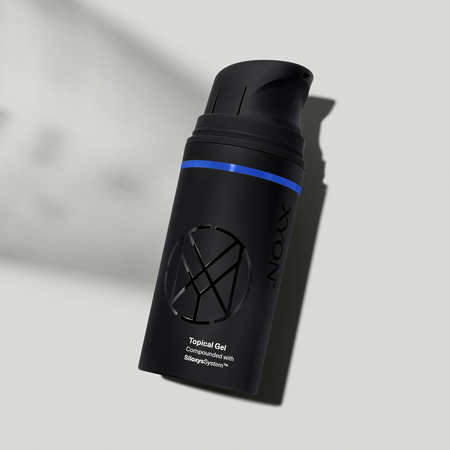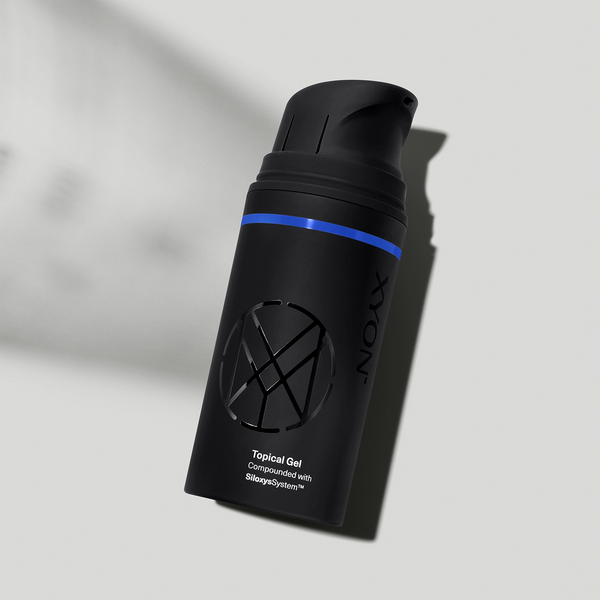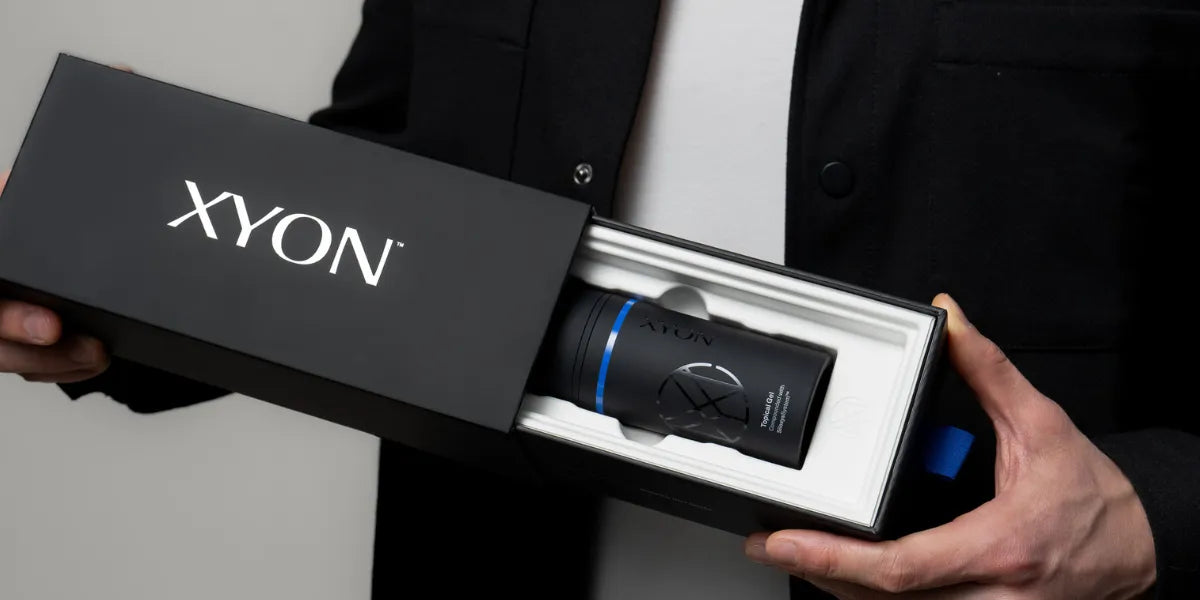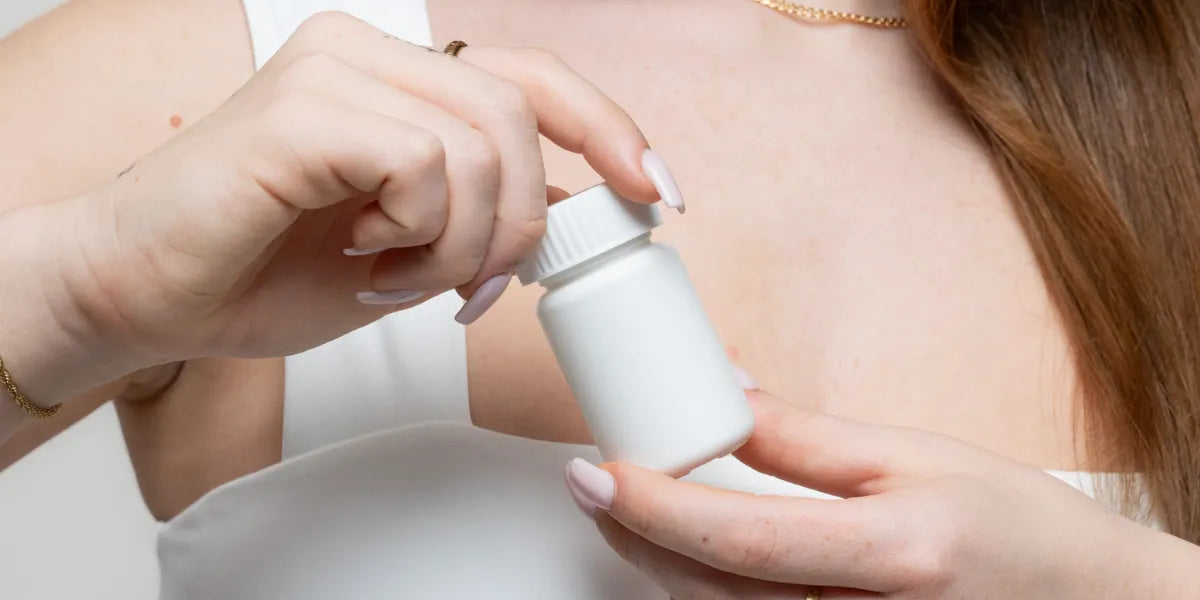Dutasteride is a DHT-blocking medication that can be prescribed off-label to treat pattern balding. It has a similar mechanism of action to finasteride, working by inhibiting the 5-alpha reductase enzyme. This enzyme is responsible for converting testosterone into DHT.
Dutasteride is able to target more than one type of the 5-AR enzyme, while finasteride can only inhibit type II. Because of this, dutasteride appears to be up to 3 times more effective at lowering the activity of the enzyme (Clark et al, 2004).


Topical Dutasteride with SiloxysSystem™ Gel treats hair loss with fewer side effects.
Combat the effects of DHT on hair follicles with a state-of-the-art formula.
What is the recommended dutasteride dosage for hair loss?
Dutasteride is most commonly prescribed off-label for hair loss at an oral dose of 0.5mg per day, but it may also be prescribed at lower doses such as 0.125mg or 0.25mg, depending on the patient. This can be beneficial for patients who may be at a higher risk for experiencing side effects as it gives the option of starting with a lower dose.
Dutasteride can also be prescribed off-label for hair loss in topical form. This means that dutasteride can be compounded in a formulation which can be applied directly to the scalp. It’s important to bear in mind that compounded treatments are not FDA or Health Canada improved, even though they may contain ingredients that are approved.
When it comes to the ideal dose or concentration for a topical formulation, it is less cut-and-dry compared to oral medications. The inactive ingredients in the base of the formula can impact how the medication interacts with the skin barrier, affecting the amount of active ingredient that is absorbed into the bloodstream. The resulting differences in how much drug is absorbed can have an impact on the efficacy and safety of the topical treatment.
XYON's dutasteride dosage explained
At XYON, topical dutasteride is compounded in SiloxysSystem Gel™, a patented delivery vehicle. This compounded topical formulation can only be prescribed following a consultation with a doctor or hair loss specialist. We often get asked how much dutasteride is in the formulation.
Topical dutasteride, with SiloxysSystem™ Gel contains 2% dutasteride. Ultimately, this concentration was decided on because it strikes the balance between safety and efficacy. Because dutasteride is a relatively new drug in the hair loss space, there aren’t currently any standardized concentrations for topical dutasteride. So, the team at XYON used years of clinical experience, coupled with an in-house clinical trial to establish the ideal concentration for this medication. It is a higher concentration than what’s found in other topical formulations of dutasteride that are currently available on the market, but this is because SiloxysSystem Gel™ serves an important function. The gel was developed to deliver medication in a controlled manner to the hair follicles, whilst limiting absorption into the bloodstream. Data shows that higher levels of absorption into the bloodstream are associated with an increased risk of side effects. Our goal was to develop topical hair loss solutions that could help mitigate this risk.
If you want to learn more about SiloxysSystem Gel™, you can read about our clinical study here.
Topical vs oral dutasteride
When it comes to the decision between taking oral or topical dutasteride, a lot of it comes down to personal preference and risk tolerance. Of course, the physician reviewing your case will also provide input on what they believe might be the best option.
In general, oral hair loss medications carry a higher risk of experiencing side effects because these drugs have greater absorption into the bloodstream. If you opt for generic oral dutasteride, your prescribing physician will be able to advise you on whether lowering your dose is a possibility, if you’re experiencing side effects.
Topical dutasteride may be an option for those who are particularly concerned about side effects and selecting a topical formulation compounded in SiloxysSystem Gel™, which was specifically designed with a focus on minimizing side effects, can further reduce your risk.
The other benefit of a topical format is that it allows you to apply the medication directly to the affected area of the scalp. SiloxysSystem Gel™ uses patented technology to create a mesh-like structure when applied to the scalp, so that the medication can be delivered in a controlled way, over time. This application method allows patients to focus treatment where it’s needed, while sustained delivery helps ensure that hair follicles receive consistent amounts of medication between applications.
Questions about dutasteride?
If you still have questions about dutasteride, we’ve got you covered. Head to our frequently asked questions page where you’ll find in-depth answers to many of your questions.
Don’t worry if you can’t quite find the answer you’re looking for, you can reach out to our experience team or even connect with one of our hair loss specialists. They’ll guide you through any concerns or questions you may have and advise you on the best treatment options for you.
References:
Clark, R.V., Hermann, D.J., Cunningham, G.R., Wilson, T.H., Morill, B.B., Hobbs, S. (2004). Marked suppression of dihydrotestosterone in men with benign prostatic hyperplasia by dutasteride, a dual 5a-reductase inhibitor. The Journal of Endocrinology and Metabolism, 89(5). https://academic.oup.com/jcem/article-abstract/89/5/2179/2844345?redirectedFrom=fulltext&login=false




